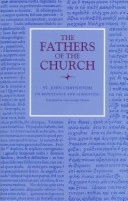Fathers of the Church
1 total work
No 96
St. John Chrysostom delivered nine homilies on repentance in Antioch of Syria sometime between 386 and 387. With conviction and certitude, he preached that repentance was a necessity for both the sinner and the righteous man. This volume presents Chrysostom's homilies on repentance and includes a sermon on almsgiving that he preached in Antioch during the winter months in 387. Chrysostom's work reveals that repentance is an indestructible pillar of the All-Holy, Universal and Immutable Church of Christ. He believed that repentance is the liturgical tool that rejuvenates sinners and admits them into the life-giving Eucharist where they experience fully and dynamically the concrete presence of God. The powers of repentance have rich biblical roots, and Chrysostom masterfully weaves his teaching with a plethora of Old and New Testament citings. From Scripture, the reader learns that repentance is never confined to the eucharistic context - it becomes a way of life for the believer. The daily applications of repentance, such as almsgiving, fasting, remorse over personal sins, humility, prayer and attending Church, suggest that a person's entire life has an ecclesial character.
Chrysostom preached that the whole experience of a true life in Christ is repentance that culminates in "metamoia" - the total change and renewal from the heart and mind of sin to "the mind of Christ" (1 Cor. 2:16). In his introduction to the homilies, Fr. Gus Christo includes a succinct biography of Chrysostom within which he sets the homilies in their chronological context. He also provides an overview of repentance and discusses the ecclesiological nature of Chrysostom's theology.
Chrysostom preached that the whole experience of a true life in Christ is repentance that culminates in "metamoia" - the total change and renewal from the heart and mind of sin to "the mind of Christ" (1 Cor. 2:16). In his introduction to the homilies, Fr. Gus Christo includes a succinct biography of Chrysostom within which he sets the homilies in their chronological context. He also provides an overview of repentance and discusses the ecclesiological nature of Chrysostom's theology.
